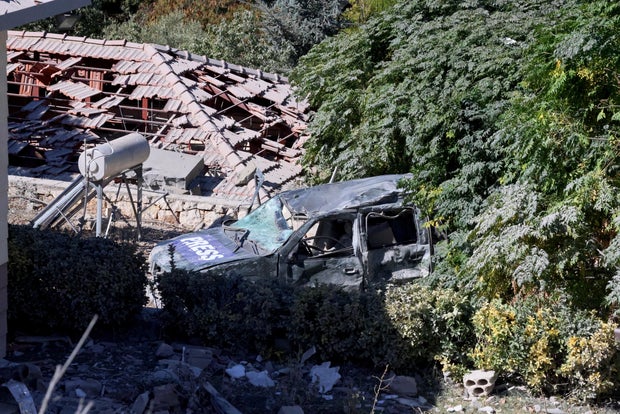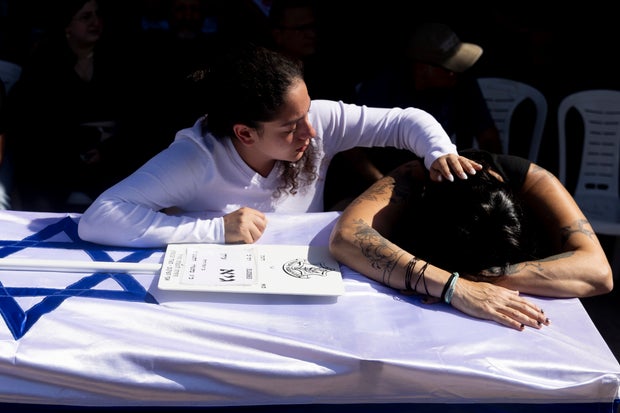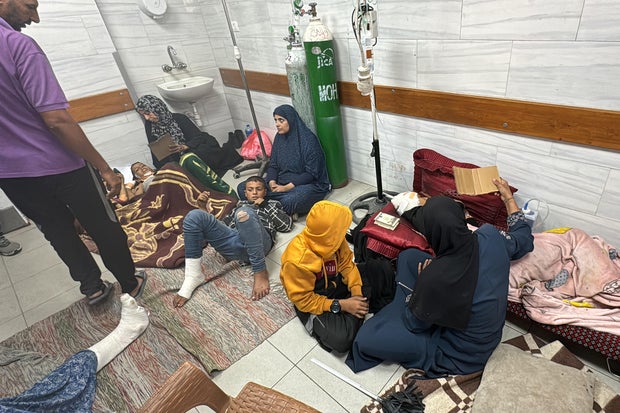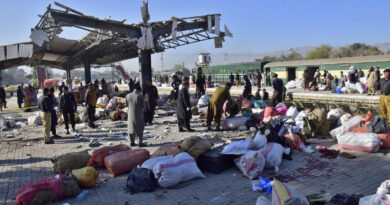Israel accused of killing journalists in Lebanon strike and children as troops storm Gaza hospital
Tel Aviv — An Israeli airstrike killed three journalists Friday in southern Lebanon, in a compound that was known to be housing more than a dozen journalists from several organizations, according to Lebanon’s health ministry. Lebanon’s Prime Minister Najib Mikati called the attack deliberate and “war crimes committed by the Israeli enemy.”
The Israel Defense Forces did not immediately comment on the strike, but later said it was looking into it.
The three journalists were identified as two camera operators and one engineer who worked for media companies linked to Iran and the Lebanese group it backs, Hezbollah, which Israel has been in an escalating war with for a year. Hezbollah has long been designated a terrorist group by the U.S., Israel and many other nations.
The pre-dawn strike about five miles inside the Lebanese border obliterated a building and destroyed at least one vehicle labeled “PRESS.”
Ramiz Dallah/Anadolu/Getty
The Associated Press and other agencies said no warning had been issued before the strike on the guesthouse where the journalists had been sleeping.
The IDF reported five casualties of its own in southern Lebanon on Thursday, saying that Hezbollah militants came out of a tunnel shaft and began lobbing grenades, prompting Israeli soldiers to return fire.
The IDF says 22 of its soldiers have been killed in action in southern Lebanon since Israel launched ground operations there at the beginning of October.
Amir Levy/Getty
Israel’s military has also pressed on and ramped up its offensive against Hezbollah’s Hamas allies in the Gaza Strip since the killing of the group’s leader Yahya Sinwar earlier this month. IDF strikes killed at least 38 people in the southern Gaza city of Khan Younis, health officials in the Hamas-ruled Palestinian territory said Friday, with at least 14 children reportedly among the dead.
In the north of the enclave, Israeli forces stormed the last operational hospital in the area, the Kamal Adwan Hospital, after two other neighboring facilities went out of service in recent days. The hospital is in Beit Lahia, northwest of Jabalia, which has been a major focus of IDF operations in recent weeks.
Health workers said IDF troops entered the hospital in the middle of the night, soon after a World Health Organization delegation left the facility.
AFP/Getty
In a statement, the IDF said forces were operating in the area of the hospital “based on intelligence information regarding the presence of terrorists and terrorist infrastructure in the area,” and that they had “eliminated hundreds of terrorists” there. The IDF said it had evacuated about 45,000 Palestinian civilians before the operation.
Three Israeli soldiers were killed in the operations in northern Gaza, the IDF said Friday.
Amid the ongoing fighting in Lebanon and Gaza, U.S. Secretary of State Antonly Blinken was back in the region this week pushing for a peace agreement.
After his 11th visit to the Middle East in a year, Blinken was in London on Friday, where he was meeting his counterparts from Jordan and Qatar, along with Lebanon’s caretaker prime minister.
After his discussion with Jordan’s foreign minister, the State Department issued a statement saying Blinken had, “underscored the importance of bringing the war in Gaza to an end, securing the release of all hostages, and alleviating the suffering of the Palestinian people.”
On Lebanon, Blinken told Jordan’s Foreign Minister Ayman Safadiin that the U.S. remained committed to working with its regional partners “to establish lasting stability” by seeking a diplomatic resolution to the Israel-Hezbollah conflict based on an existing United Nations resolution.
Blinken has said that Israel cannot leave its troops in Lebanon for an extended period of time, and that the IDF has to do more to avoid harming civilians, Lebanon’s military forces and U.N. peacekeepers based in the south of the country.
Israel confirmed Thursday that it would send its spy chief David Barnea to Qatar on Sunday for another round of talks with U.S. and regional officials aimed at hammering out a cease-fire agreement. CIA Director Bill Burns is also expected to join the meetings, along with the prime minister of Qatar, which has served as one of the mediating countries over the past year.









